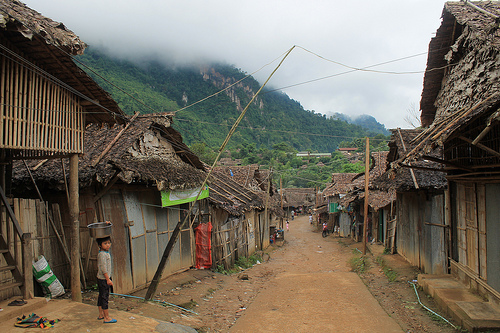More than 3,600 refugees in Mae La camp have signed a petition refusing to participate in a profiling survey, claiming the questionnaire solicits answers that favour repatriation.
The signatories fear that the information could be used as an indication of “voluntary return”, and demand that the survey be re-authored with their participation and approval.
The petition was delivered on Tuesday to UNHCR spokesperson Vivian Tan and Mae Sot field coordinator Iain Hall.
Hall responded that the petition was created by a small group of vocal opponents demanding resettlement, stating, “We have listened to this group and their specific concerns. That they cannot get what they are demanding is not a reason for the project to be derailed for everyone. That group, or any individual, if they have concerns, we will listen to them.”
Hall added that the survey is being adjusted to address the concerns of the community, and that participation is encouraged, but not mandatory.
The profiling project, originally set to begin in May, was initiated by UNHCR in collaboration with the Royal Thai Government, and has been outsourced to Thailand-based Mae Fa Luang Foundation (MFLF).
On Tuesday, a representative of MFLF stated that the project survey will not be carried out until “most of the community is on board.”
A UNHCR Summary of Discussions, distributed to camp leaders and heads of schools, states that the purpose of the project is, “to learn from the refugees in the nine camps and gather accurate information from them so that between now and if they ever choose to return to Myanmar (Burma) one day, proper preparations can be made.”
The summary further states that, “The profiling process will be a fully consultative and participatory process, where the refugees will be involved in every step. The questionnaire will be designed through consultations with the refugees.”
The first “information sessions” held with refugees in Mae La – the pilot site of the survey – began in May 2013 after the questionnaire had already been drafted.
While UNHCR and MFLF maintain that the petition was created by a small group demanding only resettlement, the 3,600 signatures on document indicates there may be broader discomfort with the survey’s contents.
The petition states that signatories do not wish to return to Burma, while also offering specific structural suggestions that create more discussion of alternatives to repatriation, such as naturalisation and registration for resettlement.
In its current state, nearly all of the questions on the survey are about life upon return. Tak-based NGO Burma Link interviewed a number of the 115 “youth representatives” selected by camp committee members to conduct the survey.
According to several of the representatives, about 80 percent of those selected abandoned the commitment after viewing the training materials and questionnaire during an April training session. The survey was postponed from the initial start date of 1 May, as originally scheduled in the summary.
“We feel cheated,” said Zin Mar, a 19 year-old Burmese refugee who was enlisted as a youth representative. “At first, we hoped we could reflect our voice through this survey… later I realised that they lied to everyone and everything.”
The representatives were also told that the survey would evaluate refugees’ opinions about the three options available to them – voluntary return to Burma, third-country resettlement and living in Thailand. Instead they found questions like: “Where in Myanmar would you voluntarily return to in order of preference?”
The youth representatives say that because the survey is administered on electronic tablets, every question must be answered in order to advance to the next. According to Hall, the issue is in the process of being resolved.
The surveyor training manual features notes next to some questions urging surveyors to explain that, “choices should be realistic,” and, “the world is watching, and access to information nowadays means that it would be difficult for anyone to get away with injustices anywhere in the world.”
Since the start of Burma’s reform process in 2010, pressure has mounted to begin the repatriation of refugees living in the nine official “temporary shelters” along Thailand’s northwestern border, even as armed conflict and religious riots in Burma have displaced approximately 220,000 persons since June 2011.
The current estimated combined population of Thailand’s border camps is around 130,000 people, many of whom were born in exile.
Thailand, which is not signatory to the 1951 UN Convention on the Rights and Status of Refugees (CRSR), has allowed the camps to operate under the coordination and assistance of The Border Consortium (formerly TBBC) and UNHCR, but since 2006 has ceased the registration of new refugees.
Nearly half of Mae La’s 45,000 residents do not have registered refugee status, which means they are ineligible for third-country resettlement.
Fears of premature repatriation are not unfounded – since the start of the reforms there has been no large-scale return of displaced persons, and some past repatriations have been disastrous.
UNHCR assisted in the infamous repatriation of about 200,000 Rohingya refugees in the early 1990’s, when a change of policy legitimised “promoting” repatriation in the process of verifying voluntariness.
This experimental period resulted in the first publication of a UNHCR Handbook for Voluntary Repatriation: International Security in 1996, containing a chapter on promoting return if the UNHCR deems it safe, which they did in the case of moving Rohingya from Bangladesh to northern Arakan state under military rule, with no guaranteed right to citizenship.
Hall says that as the Burmese government has extended a welcome for refugees to return to any part of the country at any time, “voluntary return is the preferred solution, but at this point we are not at a stage of promotion.”



